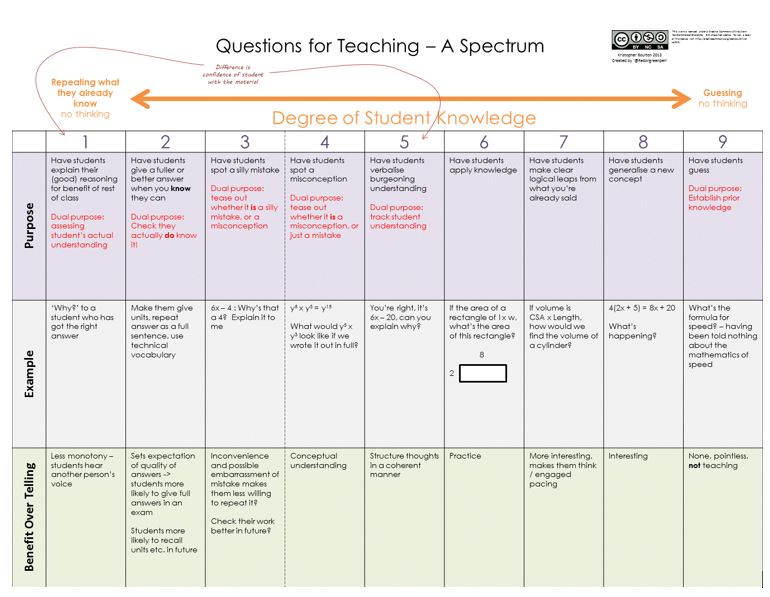Mrs Wei Fang, teacher of Mandarin at WHS, reflects on her own experience of questioning in the classroom, before reviewing a blog post by Kris Boulton ‘Should we use questions to teach?’
“…the question is not why questions are better, it is when.”
As a language teacher, I have been thinking a lot about questioning in the classroom, getting students to really think about the grammar and vocabulary they learnt, in order to improve their understanding and memorising. For example, ‘how’ questions are particularly useful in assisting students to remember Chinese characters, or hanzi: ‘How do you know the meaning of this character?’ Students would answer: It means juice 汁 because it has water radical 氵 (the components of characters that indicate meaning). I then would retrieve other learning from their long-term memory by asking an elaboration question: ‘Where else can you see this radical?’. Giving students the thinking time, asking them to connect their learning and expecting a better answer are very important strategies of questioning.
However, questions do not always go well. At times I asked a series of questions and felt like my questions were much longer than the students’ answer. They seemed to be confused about why I asked those questions. I then reflected on my lesson and realised that: why didn’t I just explain it?
So, it is time to think about why we ask questions. Kristopher Boulton argues that questions are not necessarily better than explanations, though sometimes he switches to questions when he feels the need to promote understanding. In his blog post ‘Should we use questions to teach? -1&2”, he addresses that the question is not why questions are better, it is when. He concluded that: ‘questions can be very effective tools of teaching, but they must be used with incredible care.’ A very structured grid of various question types concluded by him and another blogger can be found here:
addresses that the question is not why questions are better, it is when. He concluded that: ‘questions can be very effective tools of teaching, but they must be used with incredible care.’ A very structured grid of various question types concluded by him and another blogger can be found here:
Question Spectrum
The above matrix is made for Maths, but one can be also useful for other subjects. It brought to my attention the pointlessness of allowing students to guess without establishing their prior knowledge. In Mandarin, there is language content that is better to be explicitly taught first, especially the content that doesn’t exist in English, for example: tones, measure words, characters (not randomly drawing it but with certain orders), as well as unique culture conception such as Hukou (a system of household registration used in China), etc. In order to enhance understanding, I once asked year 7 students to analyse the tones, by asking them the differences between Chinese and English sounds. As a result of lacking enough input of Chinese, some students were struggling to tell the differences among the four tones. They told me that the rising and turning tones sound the same. In this case, further questions on this will confuse them. It made all the difference the next time when I made them practice tones for enough time, and then asked them to tell me which tones they have heard and why (verbalizing burgeoning understanding). A key quotation from Boulton that I keep in mind for my subject is ‘never ask pupils questions to which they have not already been told the answer, unless they know enough that answering the question requires them only inching forwards.’
References
Kristopher Boulton
https://tothereal.wordpress.com/2013/05/28/should-we-use-questions-to-teach-part-1/
https://tothereal.wordpress.com/2013/05/29/should-we-use-questions-to-teach-part-2/

